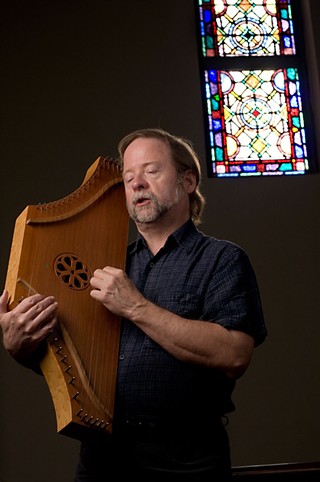Texas Early Music Project's Complaints Through the Ages
This TEMP concert collected brief melodic grievances from across the centuries, half heartfelt, half silly
Reviewed by Robi Polgar, Fri., April 27, 2018
Rare is the human who hasn't shaken a fist at fate or at the [bleep] who cut him off in traffic. Whether lamenting the state of one's love life or daily routine, everybody's got a complaint about something. Since the earliest days of songwriting, airing one's grievances in melodic form has been cathartic, entertaining, or a way to make a living. So, with complaints as the theme, the Texas Early Music Project offered a concert of songs ranging from the doleful to the comedic, covering centuries of unhap, romantic misuse, and a dislike of the daily grind.
TEMP artistic director and conductor Daniel Johnson noted that many of the selections were of pop-song duration, "gems" between three and five minutes in length that fell into one of two sensibilities: heartfelt or silly. Indeed, the concert could be fairly neatly divided into either gorgeous expressions of the soul's anguish or sonic shrugs at the nuisances of being a human being in times of pestilence, noisy neighbors, unwashed hands, hangovers, and bad husbands. Which is to say, all times.
Among the audience favorites was Monteverdi's "Ohimè dov'è il mio ben" ("Alas, where is my beloved"), a divine duet of blended female voices lush and dissonant, criss-crossing in grief. "The Bonny Earl of Murray" evoked an approving hum from the audience for this anonymously penned Scottish work, featuring a trio of female voices in a lilting, tragic lament about the murder of the unlucky earl who "was the Queen's love." Another fave was the longer, more complicated relationship revealed in "Usurpator Tiranno," ("Tyrannous Usurper") by Giovanni Felice Sances, where a mid-17th century lover exclaims a constancy that borders on the obsessive.
As noted, all complaints aren't matters of the heart, some are simply litanies of irk. Take, for example, "La teste m'y fait si grant mal" ("My head aches so badly"), a 16th century French quick take on waking up with a hangover, sung, and acted, by an aptly unsteady quartet. Twelfth century excerpts of "cranky" troubadour Lo Monge de Montaudon's "Fort m'enoia, s'o auzes dire" ("I am annoyed a great deal, if I dare say it") listed all the things that bothered the former nobleman. Sung in the original French and English, the song mentions maladies such as balking horses, babbling servants, broken belt buckles, insomnia, and "a good chord with a bad viol player."
For the finale, a collage of complaints written by the chorus, aided by Shakespeare and set to music by Pachelbel and Vivaldi. Put this one in a time capsule for future drivers on MoPac, a multi-lane lament for the ages.
The music was luscious and lovely when concerned with broken hearts, wanton lovers, and unobtainable objects of desire. For tunes dealing with daily travails and ill-suited spouses, the music turned jauntier, complementing lyrics piquant and comical. And, as ever, the individual and combined voices of the TEMP choir were delightful – arrows piercing the heart or well-aimed smacks to the forehead, depending on the particular misery in melody.
Complaints Through the Ages
First Presbyterian Church, 8001 Mesa
April 22












